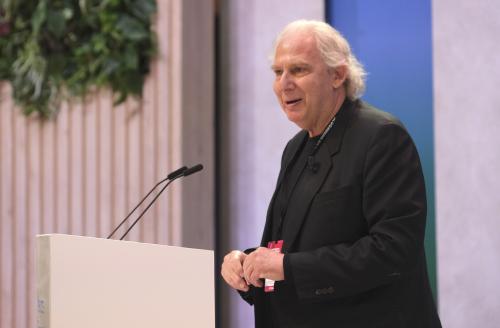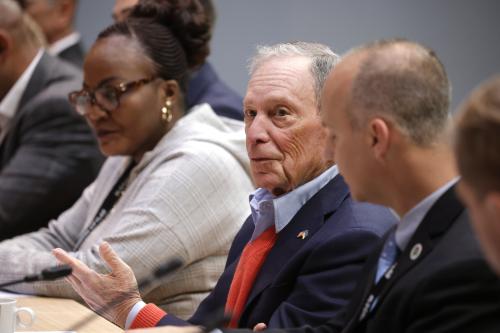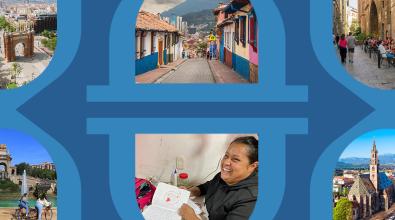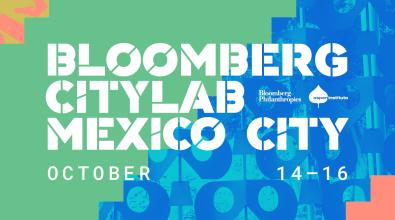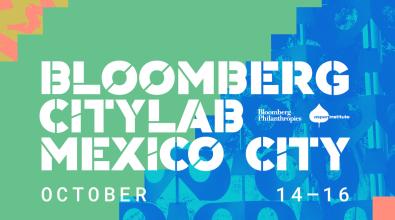Mayors building the post-pandemic economy
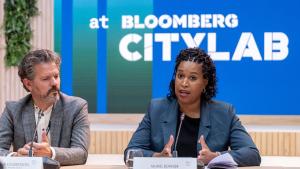
Washington, D.C. Mayor Muriel Bowser addresses her colleagues from around the world at the Mayors Innovation Studio in Amsterdam.
Among the crowd at this year’s Bloomberg CityLab summit in Amsterdam were more than 40 mayors from two dozen countries whose leadership is deeply needed in a time of recovery.
They kicked off the summit October 9 at the Mayors Innovation Studio—a unique opportunity for mayors to meet directly with leading global experts on emerging issues. This year’s focus was a challenge every mayor is wrestling with: rebuilding local economies amid continuing disruptions in how and where people work, live, shop, and play.
The biggest takeaway: Now is the time for mayors to set a bold vision for green, inclusive, and equitable growth—and to find creative ways to leverage their cities’ unique strengths and capabilities.
And while these are challenging times, it’s not all doom and gloom. Ricky Burdett, who directs LSE Cities at the London School of Economics and Political Science and spoke with the mayors, says there are new opportunities now for growth and innovation. “Everyone announced that cities would be dying,” Burdett says. “We feel that’s a premature announcement.”
Tipping points
Burdett offered mayors an overview of key economic trends they’re facing today. Investment in office space and retail was already declining before the pandemic but COVID dramatically boosted that trend, resulting in empty buildings and lost jobs, though the trends differ in different parts of the world. Online retail in the U.K., for example, made up 21 percent of the economy pre-COVID, shot up to 31 percent and the height of the pandemic, and has now settled back to 24 percent.
On remote work, the pandemic similarly accelerated an existing trend and has left confusion and uncertainty in many cities about how many workers, particularly younger ones, will physically return to offices fulltime in the future.
The visitor economy, meanwhile, offers a somewhat brighter snapshot. While business travel remains vastly diminished and may not come back fully until 2026, “some cities have really come back,” Burdett says. There are promising trendlines in many parts of the world for hotel occupancy, and a fairly quick rebound for the kinds of live cultural and artistic offerings that were so sorely lacking during pandemic lockdowns.
“Our sense is that when it comes to things like theater or clubs or bars or restaurants, it’s just very hard to do those things online,” Burdett says. He recommends that mayors leverage this advantage and invest more in the unique value of their cities’ culture industries.
Burdett offered a few more areas where mayors can seize the moment and use bold thinking to respond to a drastically changed landscape. First, with city centers seeing fewer workers, they can compete for those workers by offering parks, amenities, and other aesthetic improvements that make people more likely to want to go into the office. Second, more telecommuting can help mayors achieve their climate goals if it means fewer cars on the road and lower carbon emissions. And third, the flip side of decline in city centers may be increased growth in neighborhoods and new employment opportunities for residents.
Getting smarter with data
Ricardo Hausmann, Founder and Director of Harvard University’s Growth Lab, gave mayors more ideas to chew on. Hausmann and his colleagues have developed an analytical tool called the Metroverse that offers policymakers access to key economic data for more than 1,000 urban areas in nearly 80 countries.
The project—an outgrowth of the Atlas of Economic Complexity, which examines countries’ technological capabilities and knowledge resources—offers city officials what Hausmann believes is the key to making effective decisions about driving future economic growth. “The secret of prosperity is knowledge,” he says.
The Metroverse dataset allows cities to analyze their own capabilities and compare themselves with others. Hausmann says this data also can help cities seize opportunities that may grow out of the otherwise painful experience of the pandemic, such as looking to become a magnet for remote workers or making creative use of abandoned retail space.
His goal is for mayors to use this tool “to either revitalize their city centers, or in some cases, perhaps completely reimagine their city centers.”
Buenos Aires is a case in point. In a pre-pandemic exercise, Hausmann says leaders there used the Metroverse data to analyze why, after years of steady growth, their city had hit economic hard times. The answer: Soybean prices, after years of growth, had slowed across Argentina and the capital city was suffering from a lack of spending in the agricultural sector. The answer, Hausmann says, was for the city to develop its own engine of growth, which it has done in recent years through development of a sophisticated business services sector.
To illustrate how mayors can do similar things in their cities, Hausmann uses the word game Scrabble as an analogy. Think of the city as a collection of Scrabble letters, he says—and each letter represents the people, organizations, and capabilities needed to produce goods and services and economic growth.
“When these letters come together, they can make words, they can make products, goods, and services,” Hausmann says. The trick is to keep adding new letters to open new possibilities. “The more letters you have, the more words you can put together and the longer the words you can put together.”
Hausmann’s message for city leaders as they come out of the pandemic experience: “It has been wrenching, but it looks very hopeful now.”
